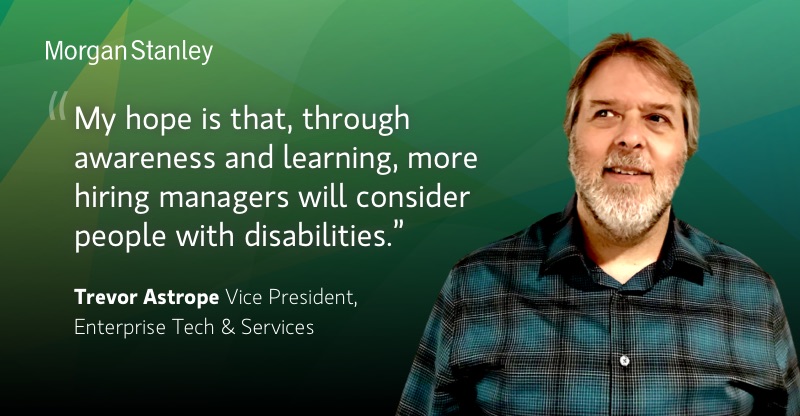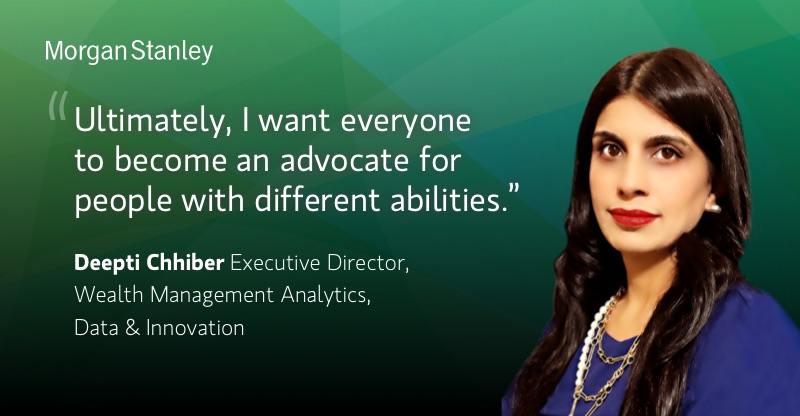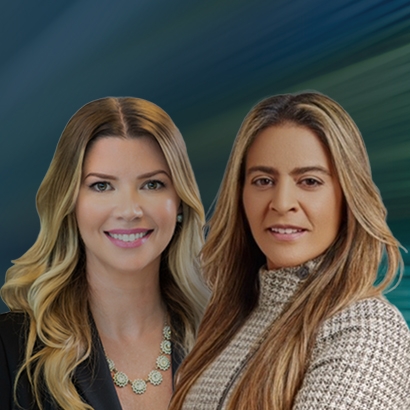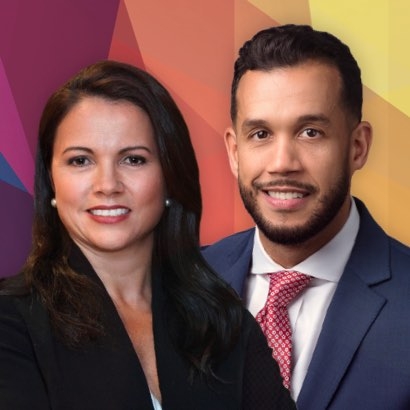Learn how we are celebrating employees with disabilities, as well as their many accomplishments, who make workplaces more inclusive.
People with disabilities play a vital role in making any workforce more diverse, inclusive and vibrant. That is certainly true here at Morgan Stanley. Many of our employees identify as differently abled. In recognition of their significant contributions, this month we’re celebrating National Disability Employment Awareness Month (NDEAM). “Of course, every day is a great day to be sensitive to the needs of our peers and friends with disabilities,” says Executive Director, Wealth Management Analytics, Data & Innovation Deepti Chhiber. “But October is a time to dedicate some extra focus time to learn more.”
That’s why the disAbility Employee Network is hosting numerous events, a keynote speaker series and other programs this month. That includes a chance to hear from Team U.S.A. Paralympic gold-medalist Oksana Masters. (Not content to master just one sport, Masters happens to be a Paralympian in rowing, cross-country skiing and cycling.) She’ll talk about overcoming obstacles, what it’s like becoming a role model for differently abled people and what everyone can do to create a more inclusive workplace and a more inclusive world.
But of course, there are differently abled role models right here at Morgan Stanley, including both Deepti and Vice President, Enterprise Tech & Services, Trevor Astrope. We reached out to them to get their take on the career barriers people with disabilities face and why this month matters.

What are some of the barriers that people with disabilities face when seeking employment today?
One of the main barriers I’ve personally experienced is bias. Some hiring managers may not even interview a candidate with a disability, because the manager may think that if they had that disability, they wouldn’t be able to do the job. There has certainly been a lot of progress made in technology that enables people, but there’s still a hiring gap. People with disabilities overall also experience higher unemployment. That’s a lot of untapped positive potential. People with disabilities offer a wide range of talents and unique skills.
You’ve been active in creating a more inclusive workplace for people with disabilities at Morgan Stanley. Can you share more about that?
I’m a co-chair of the Disabilities Workstream in the Technology Culture of Inclusion Working Group. We host a series of fireside chats with various people with disabilities to highlight how they work and the accommodations they require. Our hope is that through awareness and learning, more hiring managers will consider people with disabilities. My advice for anyone considering someone with a disability for a position is to ask the candidate what they require to be productive.
What advice do you have for people with disabilities as they seek to advance their careers in the financial services industry?
Stay determined in the face of adversity. People with disabilities can be pigeonholed into certain professions. For example, it’s common for blind people to work in a call center. Throughout my career, I’ve often started out as a consultant. It’s been a really good way to get experience and to prove myself, and in my case, it led to full-time positions. I’m also constantly teaching myself technologies. I learned Unix and Linux on my own, and this made a big impact on my career. Disabled people often need to think outside the box to overcome daily challenges. The same is true for your career.

This year’s official NDEAM theme is Disability: Part of the Equity Equation. Why is it important to include disability awareness within the broader notion of diversity, equity and inclusion?
In the workplace, people with disabilities often experience discrimination or differential treatment. That can make them feel disconnected or not a true part of the team—not included in other words. But of course, their perspectives and experiences are very much worth listening to and deserve respect. In fact, studies have shown that workplaces that include employees with disabilities are more inclusive and better for everyone. It’s also important to understand the word disability encompasses many, many people with different abilities and attributes, including many disabilities that aren’t visible.
How have your experiences as a person with a disability helped you become an even better leader?
I’ve gone through a lot of challenges to get where I am, both as a person of color and a person with an invisible disability. A lot of people may be shocked reading this, thinking, “Oh, but you look fine.” I’ve started sharing more with people about my challenges, and a big focus for me as a leader is to make sure every person on my team and around me is inclusive. Nowadays, having social intelligence is so important for leaders in an organization. We should work on training programs to increase the EQ, or Emotional Intelligence, of our leaders. That’s how we’ll be able to promote a positive culture where people are comfortable talking to each other.
What advice do you have for people with disabilities as they seek to advance their careers in the financial services industry?
Get comfortable disclosing your disability at work. That can be hard at first. It can help to build a few trusting relationships that provide space for open, honest communication. Unless peers and employers are aware of your disability, they won’t be able to take steps to support you. At the same time, don’t forget to share your positive contributions and how you help drive results for the team. No one can advocate better for you than you can for yourself.



